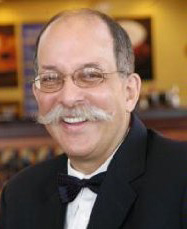
The Modern Butlers’ Journal volume 9, issue 1
International Institute of Modern Butlers
 Message from the Chairman
Message from the Chairman
With the very welcome increased interest of late in butlers by the media and amongst the newly wealthy in various countries, my wish is that those who help deliver on the promise in the year ahead, focus on communicating the standards inherent in our profession, and avoid the ever-present effort to deliver abbreviated versions in response to clients applying their usual modus operandi of “getting a good deal” simply because they do not yet understand the true nature of butling and so end up “buying themselves short.” Maintaining our standards, if I might state the obvious, is a win-win for everyone, and I’d like to see everyone winning as we move into a new year full of hope.
Butlers in the Media
Aljazeera carries an article on how graduates fresh out of butler school are being used to train prospective butlers in China, where private service butlers can expect to make 20K a year for very long hours. European butlers are in demand as status symbols but do not stay long because of the working conditions and cultural differences, and a lack of ability to do their jobs properly in the absence of the Chinese language skills necessary to manage the rest of the staff.
The BBC, on the other hand, reported that China and Russia are both experiencing a demand by their wealthy for British butlers commanding $150,000 and up. The demand in China is being met in part by six new training schools, which have been opened in China by a British recruitment agency.
CNN reports on the publication of a survey of over 2,000 domestic workers in the US—mostly immigrants and holding lower positions—who work long hours for less than minimum wage, etc. Apparently, “The Fair Labor Standards Act, which guarantees minimum wage, overtime and sick- and vacation pay, does not apply to domestic workers.” Butlers and household managers are rarely treated in this way, but one would hope that in the households they supervise, the staff are not so treated. For more information, see National Domestic Workers Alliance [www.domesticworkers.org]
As reported in multiple media, the Pope pardoned his ex-butler after he mis-used his position of trust to steal documents and leak privileged information. He was banished from the Vatican, but is receiving assistance to find a new position and house, and to start his life anew. “This is a paternal gesture toward someone with whom the Pope for many years shared his daily life,” according to the Vatican Secretariat of State.
According to the book Plutocrats: The Rise of the Super Rich and the Fall of Everyone Else, the top 10% of American households in terms of household income makes $150,000 and up—butlers themselves in many cases qualify for this category.
750,000 Americans are in the top 1%, having a household income of just under half a million dollars: such households cannot generally afford to employ a butler or household manager—but can afford housemen and other household staff. 70% of these families made their money in the past decade, almost half of them being entrepreneurs—meaning that the background of seven-in-ten rich households is not one of wealth and luxury, and therefore their exposure to butlers–and the lifestyle they make possible–has been mainly through the media and word of mouth. So this is not an optimal market for our profession.
Around 150,000 Americans have a household income of $4 million and over, and so are more likely to be able to afford to hire a butler.
Congratulations
Congratulations to General Manager, Mr. Iain McCormack, and the staff of Gili Lankanfushi in the Maldives, who were just declared the winner at the World’s Leading Luxury Resort and World’s Leading Villa Resort & Spa at the World Travel Awards Grand Final 2012. Their Mr. Fridays (butlers) were trained extensively by the Institute during October 2011.
A Creative Idea for Turndown
Whether in a private estate or luxury resort, turndown amenities are a small way the butler can add to the guest (and employer) experience. Hats off to Mr. Kobi Gutman for a new twist that is bringing about many happy guests at the private Fort Harrison hotel in Florida, where he services the top suites. He actually carves these himself, not based on any earlier training or skills, but learning as he goes. Most simply utilize a red apple, and are tailor made either to the calendar (such as Halloween or July 4) or more often, to the individual receiving the amenity (like a Ferrari enthusiast). A smattering of his “works” are provided below—including one Mona Lisa, perhaps for an art aficionado?


A Useful Resource
Congratulations to Ms. Fiona Cameron-Williams for her release of her Gentleman’s Gentleman application for the iPhone/iPad. We have not tested it yet, and look forward to some feedback from anyone who has or will.
Cigars, Part XI
 by Frank Mitchell
by Frank Mitchell
Maintaining a Humidor
When talking about maintaining a humidor, the two most important things to discuss are temperature and humidity. One sees the term Relative Humidity (RH) used quite commonly, though many people do not understand what the term means.
‘Relative’ and the fact that RH is expressed as a percentage, indicates a ratio. In simple terms, it is the amount of water vapour in a volume of air expressed as a percentage of the maximum amount of water vapour that volume of air could hold at that temperature. How much this maximum is depends on the temperature; so RH is a function of both moisture content and temperature. By itself, RH does not indicate the actual moisture content in the air, since saturation point occurs at different temperatures.
Some cigar enthusiasts scoff at the need to concern themselves with the temperature. Unless you store your cigars in a temperature-controlled environment or live in a very mild climate, I believe the temperature must be taken into account. This is because a given amount of water vapour, in a given volume of air, will have a differing RH% depending on the temperature.
The ideal environment in which to store cigars is a relative humidity of 70% at 70◦F (21.1◦C).
The below table will show that as the temperature rises, the humidity must fall. Conversely, as the temperature drops, the humidity must rise. Care must be taken not to deviate too far from the ideal, otherwise you will end up with soggy cigars or cigars which will which have lost their aromatic oils.
Reviving Dry Cigars
Don’t! It is that simple. When a cigar loses moisture, it is losing aromatic oils into a dry humidor. When the humidor is opened, these oils are lost into the atmosphere. This should not happen in a well-maintained humidor that is checked daily. Dry cigars will have lost flavour and are harsh to smoke. Re-humidifying cigars means replacing the lost aromatic oils with water. The result is always a loss of flavour and aroma.
You may research how to re-humidify cigars if you are ever given any and want to rescue them for your own consumption, but hotels that sell re-humidified cigars to guests are ripping them off. Nor should a butler serving in a private estate offer such cigars to the principal’s guests—experienced smokers will know that what you have given them is sub-standard.
Recent Graduates
Mr. Raoul Gonzales trains butlers on the Norwegian Cruise Line Vessel Dawn. He is one of the Norwegian Cruise Line’s butlers who was trained last year by the Institute to then train his fellow butlers on the hard skills of butling on a cruise ship. Here Mr. Gonzales is shown taking them through their paces on synchronized service.
Once NCL has completed the training evolution, they will offer more services throughout their fleet for their high-end guests, than any other cruise line.
 The PA’s Corner
The PA’s Corner
By Bonnie Low-Kramen
How I Learned to Speak Up
“When is the tall one going to talk?” This is what actress Olympia Dukakis used to ask other staff members at the Whole Theatre where I was the Public Relations Director before I became her Personal Assistant. I was 29 years old, it was 1986, and Olympia was my employer and mentor. We then went on to work together for 25 years.
In private service, we know that communication issues can make or break us—to learn to confront people and situations positively is a skill that builds leaders in our profession. Employers also have a fear of speaking up and there are ways that we can help them—silence is not (always) the answer.
I had so many reasons for not speaking my mind. I think these are the same reasons why many private service professionals don’t say what they know should be said and there is much suffering in silence. It’s the fear factor. The fear factor cannot be underestimated when it comes to the problem of staffers speaking up to anyone, but especially to colleagues and employers. I understand what it feels like to be mute in the face of a situation that needs to be confronted.
The fear was about appearing stupid, ill-informed, or unprepared, even though I was none of those things. There was fear of being wrong, making a mistake, and losing my job. The fear had to do with the possible reactions of fellow staffers such as: “What are you trying to pull? Are you trying to make me look bad? Are you angling for my job? Do you think you’re smarter than me? Do you think you’re better than me?”
My lack of confidence was known to me and now, Olympia, my employer, saw it in high-def and I didn’t like it. I threw myself into my job and worked hard to do it well. I took the risk to give her my opinions, and she valued what I had to say. I began finding my voice. What helped the most though was having Olympia Dukakis as a role model.
Here’s an example of what I mean. The theater director and I had already been coordinating press interviews for several weeks, all of which had progressed without any problems. Then, in front of the entire staff, he called me a “liar” and the room instantly became quiet. I was horrified at the injustice and the public humiliation. Olympia said to the director, “You must be mistaken. I know that would never happen with Bonnie. Let’s talk about this later.” And we did deal with it later. The director was a serial bully who enjoyed the power trip. The thing about bullies is that they are threatening and powerful until directly confronted. Then they shrink away and unfortunately, choose someone else to bully. Try it. Look a person straight in the eye and firmly say, “I won’t be spoken to that way” and mean it. Watch what happens.
Olympia stood up for me. She spoke up and plainly stated what needed to be said. Another time I recounted a contentious conversation I had on her behalf, and Olympia’s outraged reaction was, “You will not be spoken to like that. Don’t take it from her.” And I didn’t.
Finding my voice had everything to do with witnessing role models use theirs. Finding the words that work for you in challenging situations will work magic for your career.
I learned from Olympia that it is important to speak up and say the hard things in a way that people can hear. Time and again I witnessed the relief in the room when Olympia said the thing that everyone was thinking but no one wanted to say. In most cases, I witnessed how speaking up makes things better and the elephant in the room disappears.
Now I say the hard things, too. The trick is to not wait until little problems escalate into a big one. I would be lying if I said I am now totally comfortable speaking up, but I do it and I have become much better at it. I encourage my students to do it, too, and they excitedly tell me of the positive results. Practice definitely makes it easier.
For instance, when the producer became emotional and verbally abusive to me on the phone and I tried to speak, he cut me off. After several attempts, I calmly and firmly said, “If you will let me speak without interrupting me, I can help solve this problem. If not, I’m hanging up.” He stopped talking and we did our work.
Speaking up builds self-confidence, self-esteem, self-respect, and respect from others.
It feels like a risk. Do it anyway. I have found my voice. I learned the hard way that suffering in silence makes things worse, not better and only prolongs the inevitable in both work and in life. Life is too short.
Resources to Find Your Magic Words
Speaking Your Mind in 101 Difficult Situations by Don Gabor
Crucial Conversations: Tools for Talking When Stakes Are High by Kerry Patterson
Editor Note: Ms. Low-Kramen also provides workshops on this topic, the next one being Jan 19-20 in California.
 Let’s Talk about Wine, Part X
Let’s Talk about Wine, Part X
by Amer Vargas
New Zealand Wines
Today we fly to New Zealand in the Southern Pacific Ocean to appreciate some of the world’s newest and finest wines. New Zealand is one of the few southern hemisphere countries to produce fine wines. Compared to its northern counterparts, New Zealand shares the same latitude degrees as France and Spain, which may give an idea of the sort of favorable climate for their vineyards. Many varietals (mostly imported) benefit from the maritime climate, with long sunshine hours and sea-breeze-cooled nights.
Wine history in New Zealand began after a fashion two centuries ago when British residents devoted some time to developing drinks much consumed in their home country—their favoring of beer and other spirits, however, delayed the real blossoming of wine making until the late 1960s, when a series of historic changes ultimately led to the planting of vines in lands that had been qualified previously as marginal pasture.
New Zealand produces unique white wines, 50% being Sauvignon Blancs, as well as Chardonnays and Rieslings. These wines are notable for their purity, vibrancy and intensity: The fruit undergoing a long ripening as a result of cool temperatures, which allows flavors to develop while retaining a fresh acidity. There are 10 major wine growing regions, the most important being Marlborough and Hawke’s Bay.

New Zealand’s most grown red varietal is Pinot Noir, with Merlot and Cabernet Sauvignon also being important. Lately, Shiraz/Syrah is also being grown on previously cultivated land.
The country’s Sauvignon Blanc is widely recognized for its pungent and intense taste and its crisp acidity, which makes it easy to match with raw vegetables and salads. The Chardonnays offer a concentrated citrus and tropical fruit flavor combined with some refined minerals—and since they can yield all sort of body, they can be paired with a wide range of food, from fish and other seafood dishes such as shellfish, to poultry and citrus or vinaigrette dressed salads.
As for the reds, they are mostly full-bodied, which helps enhance medium-to-strong flavored cheeses, game and red meats.
Last, but not least, there is an excellent production of high-quality sparkling wines, following the Méthode Traditionelle (traditional method used to make Champagne).
I raise my sparkling Pelorus to this wonderful New Year that promises to be as excellent as my drink!
Please subscribe
at the top right of this page
to continue to receive these newsletters.
Follow us on Facebook & Twitter
The Institute is dedicated to raising service standards by broadly disseminating the mindset and skills of that time-honored, quintessential service provider, the British Butler, adapted to the needs of modern employers and guests in staffed homes, luxury hotels, resort, spas, retirement communities, jets, yachts, & cruise ships around the world.







